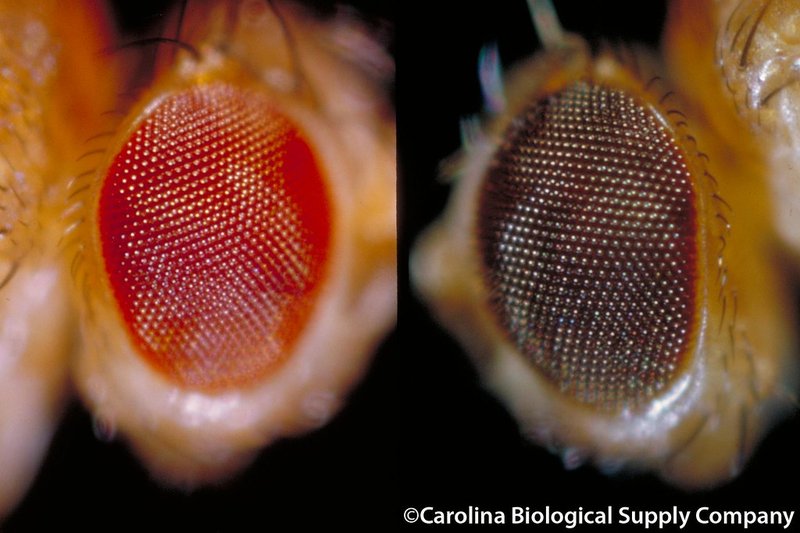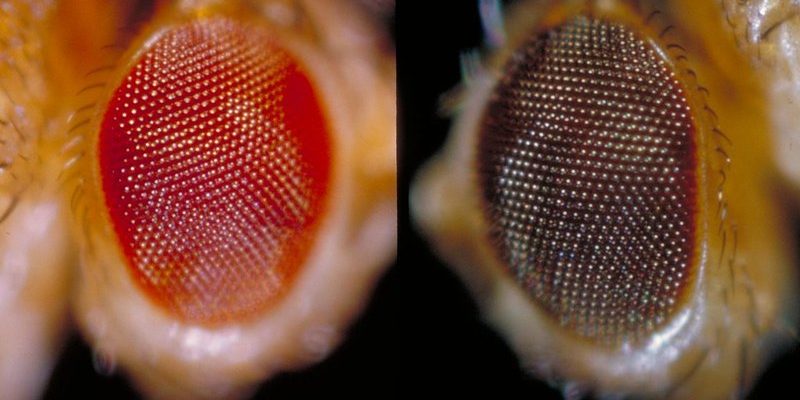
Have you ever noticed tiny flies buzzing around your overripe bananas or fermenting fruit? Those little nuisances are called fruit flies, and they have a fascinating world of their own. With their sleek bodies and distinctive features, fruit flies are more than just pests; they play crucial roles in our ecosystem and scientific research. Let’s dig into some intriguing details about these small yet mighty insects.
Fruit flies, scientifically known as *Drosophila melanogaster*, are tiny but impactful. Generally measuring about 1/8 inch long, they have a remarkable ability to reproduce quickly, making them a common sight in homes, especially during warmer months. They thrive on decaying fruits and vegetables, which is why your kitchen often becomes their favorite hangout. Understanding these creatures can provide insights into both pest control and broader scientific principles, such as genetics and evolution.
What Are Fruit Flies?
Fruit flies are small flying insects belonging to the family Drosophilidae. They are recognized globally and are particularly fond of ripe or decaying fruit, hence their name. Their bodies are typically tan with red eyes, making them quite distinct. When you see a swarm of these tiny flies, it’s their natural instinct at play—fruit flies are drawn to fermentation, which is a sign of decomposing organic matter.
These flies are not just your average household nuisance; they are also significant in scientific research. In laboratories, fruit flies are often used as model organisms due to their fast breeding cycles and genetic similarities to humans. Scientists study genetics, behavior, and even disease processes using these little creatures. Imagine that! A tiny fly can help scientists unlock secrets about our own biology.
Characteristics of Fruit Flies
| Size: | 1/8 inch (3-4 mm) long |
| Color: | Tan body with red eyes |
| Habitat: | Found globally in homes, gardens, and orchards |
| Diet: | Fermenting fruits, vegetables, and liquids |
| Lifespan: | Approximately 30 days |
| Reproduction: | Up to 500 eggs in a lifetime |
This table highlights some key characteristics of fruit flies. Their small size and short lifespan are part of what makes them so successful at breeding. A female fruit fly can lay up to 500 eggs in just a few weeks, ensuring that their population can rise and fall quickly depending on the availability of food sources.
Life Cycle of Fruit Flies
The life cycle of a fruit fly is short yet fascinating. It includes four main stages: egg, larva, pupa, and adult. The female lays her eggs on fermenting fruit, and within a day, those eggs hatch into larvae, commonly known as maggots. These larvae feed voraciously on the fruit, growing rapidly. After several days, they enter the pupal stage, where they transform into adults.
Once they emerge as adults, these fruit flies are ready to start the cycle all over again. The whole process from egg to adult can happen in just about a week under optimal conditions. This rapid life cycle is why you might notice an explosion of fruit flies seemingly overnight if you leave some overripe fruit on the counter. It’s nature’s way of ensuring that they can thrive in environments where food sources are abundant.
Behavior and Habitat
Fruit flies prefer warm, humid environments, which is why they’re often found in kitchens and gardens. They tend to be most active in the late afternoon and evening when it’s warmest. When it comes to finding food, fruit flies are particularly good at detecting the scent of fermentation. They have special receptors in their antennae that help them locate ripe fruits from quite a distance.
Interestingly, fruit flies are also social insects. They often gather in groups around food sources and use certain chemical signals to communicate with each other. This collective behavior helps them find food more efficiently. If you spot a cluster of fruit flies, it’s likely they’ve found a great spot to feast, and they’re inviting more friends!
Fruit Flies and Humans
Fruit flies are often viewed with annoyance because they swarm around our fruits and kitchens. However, they can teach us a lot about pest management. Keeping your kitchen clean and storing fruits in the refrigerator can significantly reduce outbreaks. Seal your food tightly, and don’t leave leftovers exposed. That’s the simplest and most effective strategy to avoid attracting fruit flies into your home.
Moreover, fruit flies aren’t just pests; they also contribute to various fields of study. Researchers explore their genetics to understand fundamental biological processes, including those that affect human health. They’ve been crucial in understanding diabetes, cancer, and neurological diseases. So the next time you swat at a fruit fly, remember that these little creatures have played a role in advancing science as well.
Controlling Fruit Fly Populations
If you ever find yourself hosting an uninvited swarm of fruit flies, don’t worry! There are several effective ways to control these pests. One popular method is creating a homemade trap. You can take a jar, fill it with a little apple cider vinegar, and cover it with plastic wrap, poking small holes in the top. The scent of the vinegar will attract the flies, and they’ll be unable to escape.
Another option is to keep your space clean. Regularly wipe down counters and clean up spills promptly. Dispose of any overripe fruits and vegetables, and remember that a clean environment discourages fruit flies from making your kitchen their breeding ground. Sometimes, a simple piece of advice can save you a lot of hassle.
Where Do Fruit Flies Live?
Fruit flies can be found almost everywhere humans have created habitats. They’re commonly spotted in homes, especially in kitchens, gardens, and places with lots of decaying organic matter. They thrive in warm climates and can often be found around fruit stands, orchards, and farms during harvest time. If you have a garden, be mindful that fruit flies can also breed on fallen or rotting fruit.
In your home, fruit flies might find their way in through open windows, doors, or even on the fruits and vegetables you bring in from the store. Because they are so widespread, controlling their populations requires vigilance and regular cleaning. If you’re aware of their habits, you can keep your home fruit fly-free with a bit of effort.
Importance of Fruit Flies in Ecosystems
Despite being seen as pests, fruit flies play crucial roles in ecosystems. They act as decomposers by breaking down rotten fruit and vegetables, thus helping recycle nutrients back into the soil. This process is vital for healthy plant growth. Their waste products enrich the soil, ensuring that new plants have the nutrients they need to thrive.
Additionally, fruit flies serve as food for various predators, including birds, spiders, and other insects. This makes them an important part of the food web. So, while they may be annoying at times, fruit flies contribute to the balance of nature in ways that are often overlooked.
In summary, fruit flies are more than just a household pest; they are fascinating creatures that play significant roles in both ecosystems and scientific research. Their rapid life cycles, unique behaviors, and contribution to nutrient recycling highlight their importance. So next time you see one buzzing around your kitchen, take a moment to appreciate the intricate world of fruit flies.
FAQ
What attracts fruit flies to my home?
Fruit flies are primarily attracted to ripening or fermenting fruits and vegetables. They also love sugary liquids, so things like spilled drinks or leftover wine can lure them in. To keep fruit flies at bay, store fruits in the refrigerator and clean up any spills quickly.
How can I prevent fruit flies from breeding in my kitchen?
The best prevention strategy is to keep your kitchen clean. Regularly dispose of overripe or rotten fruits, wash your countertops, and ensure that food is stored in airtight containers. Keeping compost bins sealed can also help minimize their presence.
Are fruit flies harmful to humans?
Generally, fruit flies are not harmful to humans. They don’t bite or sting and aren’t known to spread diseases. However, their presence can be a nuisance, especially in kitchens where they contaminate food. Maintaining cleanliness can help manage their populations.
How long do fruit flies live?
Fruit flies typically have a short lifespan of about 30 days. However, under ideal conditions with abundant food, they can reproduce rapidly. Their quick life cycle is one reason why you might notice a sudden increase in their numbers.
Can fruit flies be used in scientific research?
Yes, fruit flies are widely used in scientific research, particularly in genetics and biology. Their simple genetic makeup and fast life cycle make them ideal for studying hereditary traits, development, and even complex diseases. Researchers have gained significant insights into human biology thanks to studies on fruit flies.
How do I trap fruit flies effectively?
A simple yet effective trap involves using a mixture of apple cider vinegar and dish soap. The vinegar attracts the flies, while the soap reduces the surface tension, causing them to drown. You can place it in a bowl or jar covered with plastic wrap with tiny holes poked on top to trap the flies.
Do fruit flies hibernate in the winter?
Fruit flies don’t hibernate in the traditional sense, but they can slow down their activity in colder months. If they find a warm environment, like inside your home, they can remain active year-round. They may reproduce less in colder temperatures, but they won’t disappear completely.
How can fruit flies affect my garden?
In gardens, fruit flies can impact ripening fruits, as they can lay eggs on overripe produce. Their larvae feed on the fruit, which can cause spoilage and loss of quality. To protect your garden, promptly remove any fruit that starts to rot and practice good pest management.
Are there natural predators to fruit flies?
Yes, various natural predators can help manage fruit fly populations. Certain wasps, spiders, and even larger insects like ladybugs can prey on fruit flies. Encouraging these beneficial insects in your garden can provide a natural way to keep fruit flies in check.

